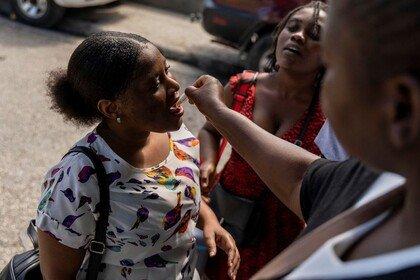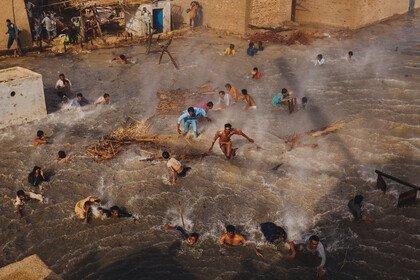
Why is cholera still a problem?
Cholera shouldn’t still be claiming lives – it’s both preventable and treatable. Understand more about the disease, how it spreads and how we can prevent it.
Research can fill knowledge gaps in combatting diseases, but without understanding the context and making findings usable for policy makers, those most affected will never feel the true impact. Rachael Hore, Senior Research Manager in Infectious Disease, shares why this matters for progress against cholera.

Tommy Trenchard / Panos
A Red Cross volunteer talks with South Sudanese refugees about the dangers of cholera and how to avoid it.

Senior Research Manager, Wellcome

Senior Research Manager, Wellcome
Cholera pandemics have affected the world since the 19th century, killing millions. The last one began in 1961 and is still affecting people today. Countries like Angola, the Democratic Republic of Congo (DRC), Sudan and South Sudan are experiencing their worst cholera outbreaks in years.
Despite being discovered centuries ago, much is still unknown about cholera. We need to better understand how and why cholera spreads, and what makes outbreaks more likely to occur in different settings.

Cholera shouldn’t still be claiming lives – it’s both preventable and treatable. Understand more about the disease, how it spreads and how we can prevent it.
Answering these questions helps inform outbreak response and prevention. With a better understanding of the disease, we can effectively design and implement interventions like vaccines and improved sanitation – but only if the findings are relevant and accessible to decision makers.
Policy makers are essential for ensuring that research has impact in the communities affected by disease. But they are often juggling competing interests under time pressures, so it is crucial that they trust science and the people behind it.
To generate findings that policy makers can act on, we must first understand what evidence they need to make decisions and work with them when designing research.
For example, Wellcome-funded researchers in Kenya looked at how cholera was spreading in Nairobi's informal settlements. They found that children were being infected by the bacterium through contact with wastewater run-off, while adults were mainly exposed to it by drinking unclean water, eating street food and surface water contact. The evidence shows a clear path to managing the spread of cholera, including safer water storage methods, food hygiene and street sanitation, alongside targeted measures like vaccination in high-risk areas.
So when a cholera outbreak hit Nairobi, this study put policy makers one step ahead. Using already identified hotspots for cholera, they worked with local community leaders and the Ministry of Health to prioritise reactive vaccination in these areas.
The authorities also educated the local communities on practices to avoid water contamination and built drainage systems to control the amount of surface water, reducing the number of people coming to health clinics with cholera.
Diseases impact people differently, whether due to age, gender, country or socioeconomic factors. This means interventions that work for some communities might not work for others, there is no one size fits all approach.
Local evidence is needed to understand how cholera impacts people around the world differently – from how effective vaccines are in different settings to the local cultures, practices, beliefs and barriers that must be considered. Flooding, drought, conflict and displacement all increase the chance of cholera infection, so it is important that the research reflects this diversity of risk. And different people in different settings have varying levels of trust in science, with perceptions often deeply rooted in politics.
Only by involving those directly experiencing diseases like cholera and carrying out research in the areas directly impacted can we generate the context-specific evidence needed to create change.
Funders must involve diverse global expertise in designing research funding calls. And researchers must consult, inform and involve the communities affected to ensure their needs and voices are considered.
Many things can change an intervention’s effectiveness, including previous infection or dose regimens. But there are still significant gaps in our understanding of the role different factors might play. Addressing these gaps is crucial for ensuring the best solutions reach the populations who need them most.
For example, in 2022, due to oral cholera vaccine shortages, the World Health Organization changed its recommendation to prioritise one dose of the vaccine for reactive use, rather than the standard two doses. But what is the real-world impact of receiving just one dose?
We’re funding research to help answer some of the questions around vaccine use in different settings, like who should be prioritised, how many doses are needed and the time between doses.
One team of researchers looked at the impact of giving one dose of the oral cholera vaccine in response to an outbreak in the DRC. They found that while adults and children get short-term protection, this begins to fade in the long-term, particularly in children. While in Bangladesh, another team have been investigating whether more targeted vaccinations can help reduce the spread. And in Mozambique, researchers plan to assess the impact of preventative oral vaccination campaigns – one of the first proactive campaigns since 2022 – in areas with the highest cholera risk.
These studies, carried out in high disease prevalence areas and co-designed with affected communities, will provide vital insights for future vaccination policies.
To protect people everywhere, policies need to be grounded in evidence. For global and local decisions to be evidence-based, research findings need to be digestible and usable.
If we want research to drive real-world change, it must be responsive to the needs of communities affected and those who shape policy. Involving policy makers and communities in research design from the start builds trust and generates representative findings.
We must move beyond research in a bubble to turn evidence into decisions and knowledge into impact.
In 2018, Wellcome and the UK Government's Foreign, Commonwealth and Development Office funded 11 research projects to explore where cholera is present, how it spreads, and the effectiveness of different intervention strategies.
A new report shares a comprehensive evaluation of these projects, with recommendations for how funders and research teams can promote and design more impactful research.

Senior Research Manager
Wellcome
Rachael is a Senior Research Manager in the Infectious Diseases vaccines team, focusing on research uptake. This involves working with research teams, decision makers and affected communities throughout projects – from designing research with impact in mind to ensuring that evidence is accessible.
Connect with Rachael:


